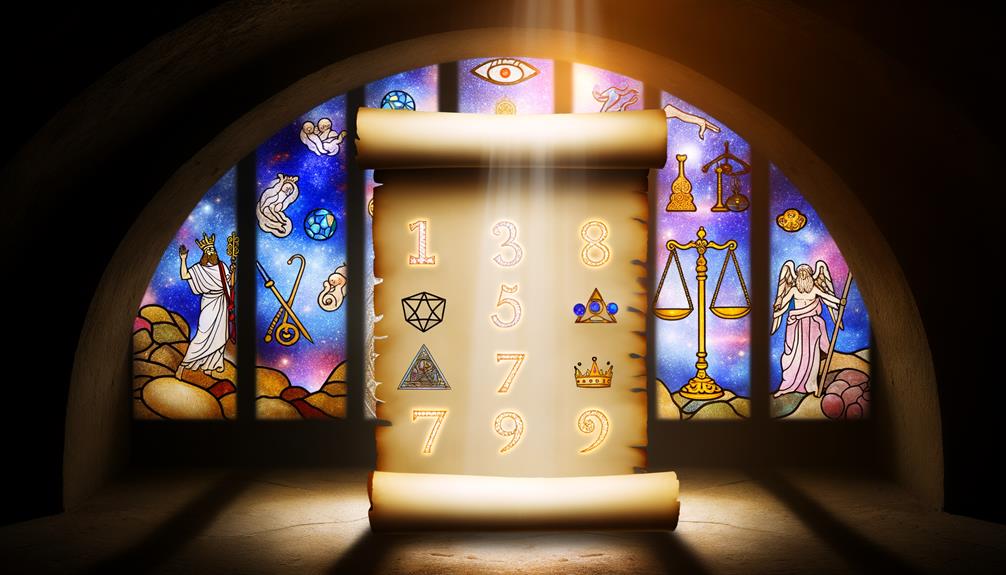921 Meaning in the Bible: Faithful Service and Growth
In biblical numerology, the number 921 encapsulates profound theological themes through its digits. Nine signifies divine completeness or judgment as exemplified in Galatians 5:22-23.
Two represents witness and support, grounded in Deuteronomy 19:15, while one embodies unity and primacy, reflecting Ephesians 4:4-6. Historically, these numbers align with ancient cultural practices and scriptural narratives, contributing to a deeper understanding of God’s divine plan.
This multifaceted number can reveal intricate layers of divine truths and spiritual principles, urging one to grasp its extensive biblical significance.

921 Meaning in the Bible: Spiritual Insights and Divine Symbolism
| Aspect | Meaning |
|---|---|
| Numerology Significance | 921 combines the energies of 9 (spiritual completion, wisdom, and divine purpose), 2 (balance, partnership, and faith), and 1 (new beginnings, leadership, and unity with God). |
| Biblical Context | Represents the end of one spiritual chapter and the start of another, emphasizing divine timing and God’s purpose. The number reflects the completion of a cycle and the preparation for a new path. |
| Spiritual Insight | Encourages believers to trust God during transitions, reminding them that spiritual growth and renewal come through faith and balance. |
| Symbolism | Reflects the journey of completion and new beginnings, calling for steadfast faith and trust in divine guidance. |
| Message for Believers | A reminder to seek spiritual alignment, embrace change as part of God’s plan, and trust His guidance for future endeavors. |
Biblical Numerology Overview

In the domain of biblical scholarship, the study of numerology involves examining the symbolic and theological significance of numbers within the Holy Scriptures. Numbers in the Bible often transcend their literal meanings, embodying divine principles and cosmic truths.
For instance, the number seven frequently symbolizes completeness or perfection, as evidenced in the creation narrative (Genesis 1). Similarly, forty often denotes periods of testing or judgment, such as the Israelites’ forty years in the wilderness (Exodus 16:35).
This intricate web of numerical symbolism enriches biblical narratives and theological doctrines, offering profound insights into God’s nature and His plan for humanity. Scholars meticulously analyze these numbers within their historical and cultural contexts to reveal deeper layers of scriptural understanding, thereby enhancing spiritual comprehension.
Symbolic Meaning of 921

The symbolic meaning of the number 921 in the Bible requires a nuanced exploration of its individual digits—9, 2, and 1—each of which carries distinct theological and scriptural significance. The number 9 often symbolizes divine completeness or judgment, as seen in the Nine Fruits of the Spirit (Galatians 5:22-23). The number 2 represents witness and support, reflecting the concept of testimony found in scriptures like Deuteronomy 19:15. Finally, the number 1 signifies unity and primacy, underscoring the sovereignty of God (Ephesians 4:4-6).
| Digit | Symbolic Meaning | Scriptural Reference |
|---|---|---|
| 9 | Divine Completeness | Galatians 5:22-23 |
| 2 | Witness/Support | Deuteronomy 19:15 |
| 1 | Unity/Primacy | Ephesians 4:4-6 |
Old Testament References
Exploration of Old Scriptures references reveals that the number 921, when deconstructed into its individual digits, carries profound theological implications rooted in ancient scripture.
The number 9 often symbolizes divine completeness or finality, as seen in the nine fruits of the Spirit listed in Galatians 5:22-23.
The digit 2 signifies union or division, reflecting the dual nature of humanity’s relationship with God, as illustrated in Genesis with the creation of man and woman.
Ultimately, the number 1 represents unity and primacy, echoing Deuteronomy 6:4’s declaration of God’s oneness.
When these elements converge, the composite number 921 encapsulates themes of divine perfection, relational duality, and inherent unity, offering a rich tapestry of meaning within the Old Testament context.
New Testament References
Drawing from the New Covenant, the number 921 can be seen to underscore themes of spiritual growth, community, and divine revelation, as evidenced by its constituent digits appearing in various significant passages. The New Scripture often utilizes numbers symbolically, and here, ‘9’ speaks of divine completeness, ‘2’ of witness and testimony, and ‘1’ of unity and primacy. For instance, in Acts 9:21, we observe Saul’s transformation, illustrating spiritual rebirth. Similarly, Matthew 9:21 recounts the faith of a woman healed by Jesus, signifying personal revelation and divine intervention. These references collectively highlight the profound messages embedded in biblical numerology. Furthermore, the interplay of these numerical symbols invites believers to reflect on their own journeys of faith and the importance of community support in spiritual endeavors. As we delve deeper into such interpretations, one can also explore the intriguing concept of ‘888 biblical significance and interpretation,’ which often denotes abundance and new beginnings, further enriching our understanding of the divine narrative woven throughout scripture. By embracing these layers of meaning, we can cultivate a deeper appreciation for the spiritual lessons that numbers offer in biblical texts.
| Passage | Theme |
|---|---|
| Acts 9:21 | Spiritual Transformation |
| Matthew 9:21 | Faith and Healing |
| Galatians 1:9 | Gospel Integrity |
| Romans 12:1-2 | Living Sacrifice |
| Ephesians 2:1 | Spiritual Resurrection |
Historical Context

Numerous historical events and cultural practices from the ancient Near East provide essential background for understanding the symbolic and theological significance of numbers in the Bible.
For instance, the number seven, often associated with completeness and divine perfection, echoes the ancient Mesopotamian creation myths and the seven-day week cycle (Genesis 1:1-2:3).
Similarly, the number forty, symbolizing periods of trial and transformation, aligns with the forty years the Israelites wandered in the desert (Exodus 16:35) and Jesus’ forty days of fasting (Matthew 4:2).
Understanding these cultural and historical underpinnings enriches our comprehension of biblical narratives, revealing layers of meaning that transcend mere numerology and reflect deeply embedded theological principles within the scripture.
Theological Interpretations

In examining the theological interpretations of the number 921, it is essential to explore its symbolism within the broader framework of biblical numerology, which often imbues numbers with profound spiritual meanings.
Scriptural references throughout both the Old and New Scriptures reveal patterns and connections that suggest deeper theological significance.
Symbolism of Numbers
Frequently in theological studies, the symbolism of numbers in the Bible reveals profound insights into divine truths and spiritual principles.
Historical context illuminates how numbers like seven and twelve embody completeness and divine order. Genesis 1 describes creation in seven days, symbolizing divine perfection. Similarly, the twelve tribes of Israel (Genesis 49) and the twelve apostles (Matthew 10:1-4) signify God’s ordained governance.
Numbers also convey spiritual journeys, such as the forty years of Israel’s desert wanderings (Exodus 16:35) and Jesus’ forty days of temptation (Matthew 4:2).
These instances underscore how numbers transcend mere quantification, encapsulating theological concepts that resonate across scriptural narratives, enhancing our understanding of God’s interaction with humanity.
Biblical Numerology Insights
Building upon the rich symbolism of numbers, biblical numerology offers profound theological interpretations that reveal deeper layers of meaning within scripture. Numbers like seven, twelve, and forty frequently appear, each carrying significant weight.
Seven: Often seen as the number of perfection and completion, as reflected in Genesis 2:2-3 with God’s rest on the seventh day.
Twelve: Symbolizes divine government and order, evident in the twelve tribes of Israel and the twelve apostles (Matthew 10:1-4).
Forty: Represents periods of testing and trial, illustrated by the forty days of Jesus’ temptation in the wilderness (Matthew 4:2).
These numerical patterns enrich our understanding of biblical narratives, emphasizing God’s intentional design and the theological depth underlying historical events.
Scriptural Significance Explored
Through examining the scriptural significance of numbers, we uncover layers of theological meaning that illuminate God’s divine plan and the spiritual truths embedded within biblical narratives.
Numbers such as seven, symbolizing completeness and divine perfection (Genesis 2:2-3), and forty, representing periods of testing and transformation (Exodus 24:18; Matthew 4:2), are more than mere quantities; they are imbued with profound theological implications.
The number twelve, denoting divine authority and governance, is evident in the twelve tribes of Israel (Genesis 49:28) and the twelve apostles (Matthew 10:2-4).
This exploration invites deeper understanding of God’s interactions with humanity throughout history, affirming that every numeral within scripture serves as a confirmation to His meticulous orchestration of the universe.
Spiritual Significance

The spiritual significance of the number 921 in the Bible can be examined through the lens of biblical numerology, where numbers often carry profound symbolic meanings.
Historically, the combination of the numbers 9, 2, and 1 has been seen to signify finality, duality, and unity respectively, offering a rich tapestry of interpretations.
Scriptural references to these numbers may provide further insight into their spiritual implications, as seen in passages such as Matthew 18:20 and Genesis 1:9, which underscore themes of divine completeness and the gathering of God’s people.
Biblical Numerology Insights
In Biblical numerology, the number 921 encapsulates profound spiritual significance, often interpreted through the lens of scriptural references and theological insights. This number is not directly mentioned in the Bible but is derived from the sum of significant scriptural numbers that imply divine completeness and spiritual growth.
Key theological insights include:
- Divine Completeness: The number 9 often symbolizes divine completeness or finality, as seen in the fruits of the Spirit (Galatians 5:22-23).
- Witness and Evidence: The number 2 signifies witness and evidence, a theme recurrent in both Old and New Scriptures.
Through these elements, 921 is seen as a holistic representation of spiritual truths.
Symbolism and Interpretations
Interpreting the symbolism of the number 921 within the Bible necessitates a robust understanding of its constituent elements—divine completeness, witness, and unity—each of which resonates deeply with scriptural themes and theological doctrines.
The number 9 often signifies divine completeness and finality, as seen in the nine fruits of the Spirit (Galatians 5:22-23).
The number 2 represents witness and testimony, recalling the principle of truth established by two or more witnesses (Deuteronomy 19:15).
Finally, the number 1 symbolizes unity and the oneness of God (Ephesians 4:4-6).
Together, these elements combine to reflect a holistic spiritual narrative, emphasizing the thorough and unifying nature of God’s divine plan, as witnessed throughout biblical history.
921 in Biblical Prophecy

Within Biblical prophecy, the number 921 carries significant meaning, often symbolizing divine completeness and judgment as evidenced through various scriptural narratives and prophetic visions. This number is intricately linked to the culmination of God’s plan and the ultimate restoration of order.
Historical analysis reveals that:
- Prophetic Books: Several prophetic texts, such as Daniel and Revelation, hint at cycles and periods that align with the thematic essence of 921.
- Numerical Symbolism: In Hebrew numerology, the combination of 900, 20, and 1 underscores a divine orchestration of events leading to ultimate fulfillment.
Scriptural references emphasize the profound theological implications of 921 in prophetic contexts.
Modern Applications

The number 921 continues to hold theological significance in modern times, offering a framework for understanding divine orchestration and ultimate fulfillment in contemporary spiritual practice.
Rooted in scriptural references such as Psalm 92:1, which exhorts believers to give thanks and sing praises to the Lord, the number 921 symbolizes gratitude and worship.
Historically, this numeral has been linked to periods of spiritual renewal and communal harmony, reflecting its enduring relevance.
In today’s context, 921 serves as a reminder of God’s meticulous plan, encouraging believers to trust in divine timing and purpose.
Conclusion
The number 921, while not explicitly mentioned in the Bible, finds significance through the lenses of biblical numerology and theological interpretation.
Historically, numbers have played an essential role in conveying deeper meanings within scripture. An interesting statistic is that there are over 100 distinct numbers referenced in the Bible, each with unique symbolic implications.
The exploration of 921 consequently provides an enriching perspective on how numbers can shape understanding of biblical prophecy and spiritual teachings.






